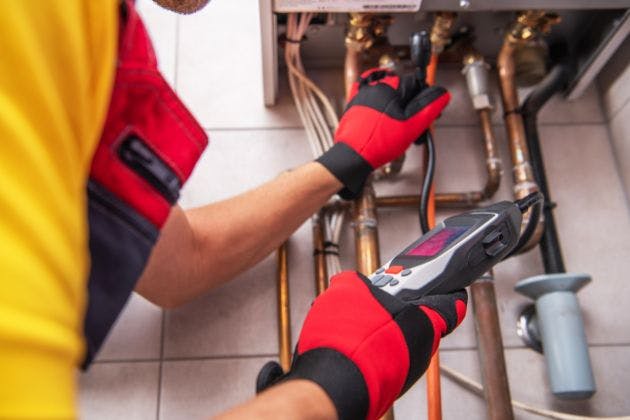When it comes to household safety, detecting gas leaks is one of the most important responsibilities a qualified engineer can handle. A gas leak, if left unchecked, can lead to dangerous health risks and property damage. For homeowners in Dunmow, Bishops Stortford, Saffron Walden, and Chelmsford, understanding how gas engineers check for gas leaks helps build trust and ensures that you know what to expect during an inspection. At He@Heating Limited, our Gas Safe registered engineers use a range of advanced tools and tested methods to locate and repair leaks efficiently and safely.

How Professional Gas Engineers Detect Gas Leaks
Visual and Physical Inspection
The inspection begins with a careful visual assessment of all visible pipework and gas appliances. Engineers look for any corrosion, loose fittings, or cracks in pipes that might suggest a leak. They also listen for hissing sounds or check for the smell of gas, which has a distinctive odour added for easy detection. Even though some leaks are too small to detect through smell or sound, this visual check helps identify any obvious or surface-level problems before moving on to more technical testing.
Pressure Testing and Tightness Testing
One of the most reliable ways to detect gas leaks is through a tightness test. Engineers use specialised equipment such as a manometer or digital pressure gauge to measure gas pressure levels within the system. During this test, the engineer isolates the gas supply and records the initial pressure. After a short waiting period, they check again. If the pressure has dropped, this confirms there’s a leak somewhere in the system. It’s a precise and effective way to detect leaks that might otherwise go unnoticed.
Using Electronic Gas Detectors
To locate the exact source of the leak, engineers use electronic gas detectors, often referred to as “gas sniffers.” These handheld devices can sense even the smallest traces of natural gas or methane in the air. By slowly moving the detector along pipe joints, valves, and connections, engineers can identify where gas is escaping. This method is particularly useful for leaks that are hidden behind walls or under floors, where visual access is limited.
Tracer Gas and Leak Detection Spray
In more complex cases, engineers may use tracer gases or leak detection sprays. Tracer gases, such as hydrogen or nitrogen-hydrogen blends, are introduced into the pipework under controlled pressure. As the gas escapes, it can be detected by specialised sensors. Leak detection sprays, on the other hand, are applied to pipe joints; if bubbles form, it confirms a leak. These tools are valuable for confirming results after pressure testing and ensuring every possible source of leakage has been identified.
Appliance Safety and Combustion Checks
After testing the pipework, the engineer inspects your gas appliances. This includes boilers, cookers, and fires. The aim is to ensure they are burning gas efficiently and venting correctly. A flue gas analyser may be used to measure carbon monoxide levels and check combustion quality. If an appliance is producing too much carbon monoxide or isn’t ventilated properly, it could be a sign of incomplete combustion, another dangerous gas-related issue.
Repair and Verification
Once the leak is found, the engineer will isolate the section of pipework and carry out necessary repairs. After repairs are made, another tightness test is performed to ensure that the system is completely sealed and safe to use. This verification step is crucial as it guarantees that no further leaks exist and your home’s gas supply is safe.
Preventing Gas Leaks in the Future
While gas leaks can happen unexpectedly, regular maintenance and annual boiler servicing can help reduce the risk. Keeping your appliances serviced ensures that fittings remain tight, components function properly, and corrosion is spotted before it causes damage. If you ever smell gas, hear a hissing noise, or feel dizzy or nauseous without explanation, leave your property immediately, avoid switching on electrical devices, and call for professional help. Do not attempt to locate or repair a gas leak yourself.
Stay Safe with Professional Gas Leak Detection in Dunmow, Bishops Stortford, Saffron Walden, and Chelmsford
He@Heating Limited offers professional gas leak detection and repair services across Dunmow, Bishops Stortford, Saffron Walden, and Chelmsford. Our experienced Gas Safe registered engineers use industry-approved methods to keep your home safe, efficient, and compliant. Call 07956 575049 or fill out our contact form to book your gas safety inspection today.


